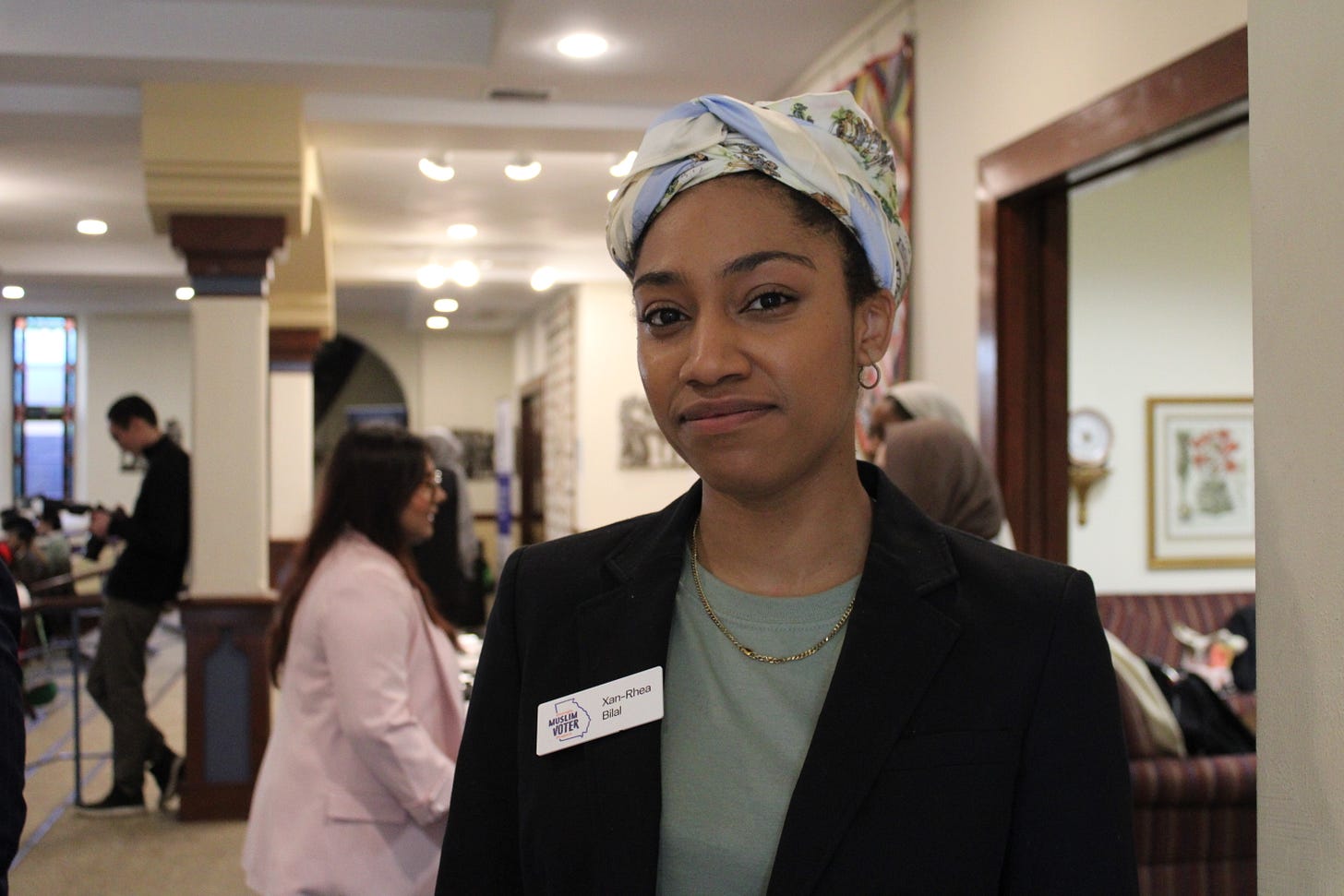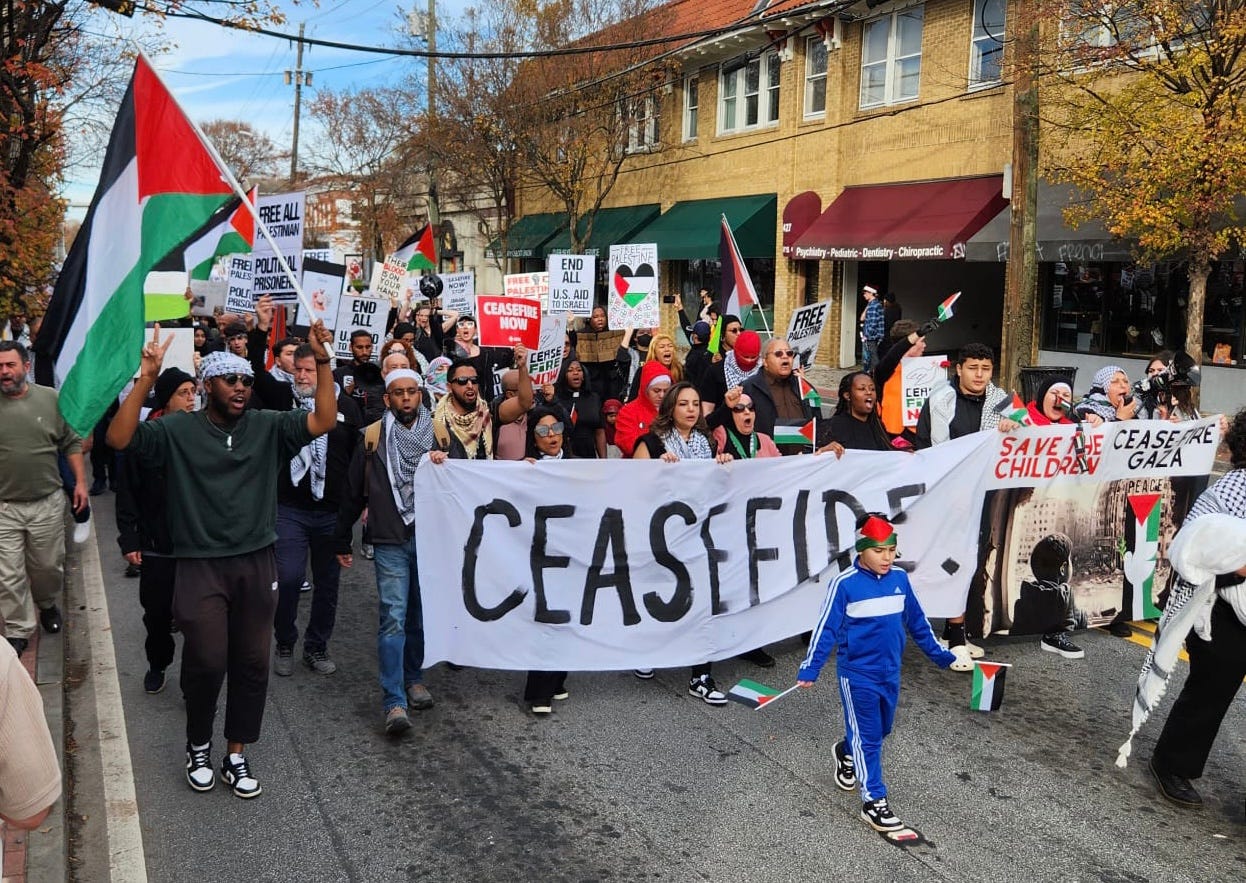“We’re here, and we stand behind something.”
Organizers in Georgia channel frustration over Gaza to the ballot box
Writer/reporter: Sophia Qureshi. Editor: Sam Worley.
On any given day, Xan-Rhea Bilal might be at a mosque, school, or a community event, trying to connect members of her community with the political process. A senior organizer for the Georgia Muslim Voter Project, a nonpartisan nonprofit, Bilal heads up a team of up to 11 canvassers who register Muslim Americans to vote, provide them information on candidates, and let them know where and how they can cast their ballots.
It can be a difficult job: Together, Bilal and her team are responsible for reaching more than 70,000 Georgia residents on their list of Muslim voters, in addition to constantly identifying and registering more.
But now, five months into Israel’s war in Gaza, she’s in unprecedented territory.
Many of the voters she speaks with, Bilal says, are both fatigued and frustrated—so much so that asking them about their feelings on the democratic process can seem almost triggering. “We may be at a masjid on Friday, or we may be at a festival. They just aren’t prepared for somebody to come up to them and ask them about voting,” she said.
Many of the people Bilal speaks with have been making their voices heard—calling lawmakers, writing emails, and engaging in coordinated actions in support of a permanent ceasefire. With none in sight, Bilal says she’s coming up against a lot of frustration. “We are doing everything we can to end this absolute carnage,” voters tell her. That the U.S. hasn’t wavered in its support of the Israeli siege is “the main frustration we are seeing.”

Now, a coalition of groups is channeling that energy into Georgia’s primary election, which is just days away. They’re promoting the Listen to Georgia - Leave It Blank campaign, which urges voters to do just that: go to the polls on Tuesday, ask for a Democratic primary ballot, and leave it blank. The idea is to send a message of disapproval to President Joe Biden, who won Georgia in 2020 by a margin of less than 12,000 votes—with the support of many minority communities now strongly opposed to the war, including thousands of Muslim voters.
Leave It Blank follows a similar initiative in Michigan—where more than a hundred thousand people voted “uncommitted” in last month’s primary—that’s spreading to states around the country: This week, hundreds of thousands of voters in Minnesota, Massachusetts, and elsewhere also selected “uncommitted” or “noncommitted” options on their ballots.
Georgia’s primary election will be the first for Alisha Hussain, an Augusta University medical student who grew up in Gwinnett County. Since October, she hasn’t been able to look away from the images coming out of Gaza, where over 30,000 people have been killed. “I’m usually not very attached to my phone. But it’s so live, and so visual on social media, and you see it everywhere,” Hussain says. “The bombing, people injured in hospitals, limbs being severed, children passing away, mothers crying for their children—it’s just one of the worst sights to ever be seen.”
At school, she’s attended protests, organized campus teach-ins, and is now volunteering for “Leave It Blank.” She’s a part of the campaign’s youth outreach group, which communicates mostly through WhatsApp; she’s using Instagram and hopes to coordinate with Muslim Student Associations across the state to get the word out.
“It will be a very frenzied campaign over the next week, God willing, but we are hoping that a noteworthy number of Georgians will take the step to send a message to the president,” Edward Mitchell, the former director of the Georgia chapter of the Council on American-Islamic Relations, told 285 South. He’s now a board member of CAIR Action, which is among the organizations involved in the campaign. Mitchell says a coalition of local and national groups—including Voices of Muslims, the Peach State Muslim Coalition, and the Arab American Anti Discrimination Committee—are spreading the word through social media, public events, and door-to-door interactions “to make sure people know this is an option.”
Though Arab American and Muslim American groups are leading the charge, they’re not alone in their efforts to bring about an end to the war.
“This is a movement that speaks to a lot of different people—young voters, particularly,” says Marisa Pyle, a voting rights organizer and a member of Jewish Voice for Peace Action, which has staged pro-Palestine protests around the country. Pyle grew up in Dahlonega, where her family started a synagogue. On Tuesday, she joined around 20 other people for a phone banking initiative for Leave It Blank. “You don’t have to have an identity that is immediately tied to one side or the other of this crisis,” she says. “There are also just folks who are just Georgians and voters and [are] horrified.”
Whatever happens in Georgia on Tuesday, it's clear that people across the country have been able to mobilize, in a very short time frame, without much money behind them. “I think in Georgia, we can turn that vote out very quickly, because we are very socially connected,” said Samia Abudulle, a Gwinnett County resident, originally from Somalia.
For many in Georgia, like Alisha Hussain, nothing is more important right now. Encouraging voters to use their leverage “could be the difference in showing politicians that, hey, we’re here, and we stand behind something,” Hussain says. “And your power comes from the people.”



